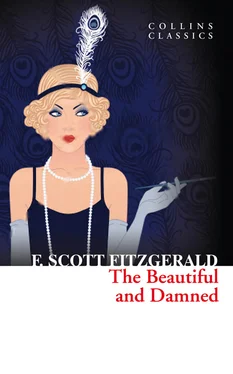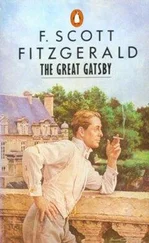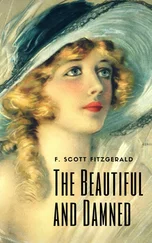The span of his seventy-five years had acted as a magic bellows—the first quarter-century had blown him full with life, and the last had sucked it all back. It had sucked in the cheeks and the chest and the girth of arm and leg. It had tyrannously demanded his teeth, one by one, suspended his small eyes in dark-bluish sacks, tweeked out his hairs, changed him from gray to white in some places, from pink to yellow in others—callously transposing his colors like a child trying over a paintbox. Then through his body and his soul it had attacked his brain. It had sent him night-sweats and tears and unfounded dreads. It had split his intense normality into credulity and suspicion. Out of the coarse material of his enthusiasm it had cut dozens of meek but petulant obsessions; his energy was shrunk to the bad temper of a spoiled child, and for his will to power was substituted a fatuous puerile desire for a land of harps and canticles on earth.
The amenities having been gingerly touched upon, Anthony felt that he was expected to outline his intentions—and simultaneously a glimmer in the old man’s eye warned him against broaching, for the present, his desire to live abroad. He wished that Shuttleworth would have tact enough to leave the room—he detested Shuttleworth—but the secretary had settled blandly in a rocker and was dividing between the two Patches the glances of his faded eyes.
“Now that you’re here you ought to do something,” said his grandfather softly, “accomplish something.”
Anthony waited for him to speak of “leaving something done when you pass on.” Then he made a suggestion:
“I thought—it seemed to me that perhaps I’m best qualified to write—”
Adam Patch winced, visualizing a family poet with a long hair and three mistresses.
“—history,” finished Anthony.
“History? History of what? The Civil War? The Revolution?”
“Why—no, sir. A history of the Middle Ages.” Simultaneously an idea was born for a history of the Renaissance popes, written from some novel angle. Still, he was glad he had said “Middle Ages.”
“Middle Ages? Why not your own country? Something you know about?”
“Well, you see I’ve lived so much abroad—”
“Why you should write about the Middle Ages, I don’t know. Dark Ages, we used to call ’em. Nobody knows what happened, and nobody cares, except that they’re over now.” He continued for some minutes on the uselessness of such information, touching, naturally, on the Spanish Inquisition and the “corruption of the monasteries.” Then:
“Do you think you’ll be able to do any work in New York—or do you really intend to work at all?” This last with soft, almost imperceptible, cynicism.
“Why, yes, I do, sir.”
“When’ll you be done?”
“Well, there’ll be an outline, you see—and a lot of preliminary reading.”
“I should think you’d have done enough of that already.”
The conversation worked itself jerkily toward a rather abrupt conclusion, when Anthony rose, looked at his watch, and remarked that he had an engagement with his broker that afternoon. He had intended to stay a few days with his grandfather, but he was tired and irritated from a rough crossing, and quite unwilling to stand a subtle and sanctimonious browbeating. He would come out again in a few days, he said.
Nevertheless, it was due to this encounter that work had come into his life as a permanent idea. During the year that had passed since then, he had made several lists of authorities, he had even experimented with chapter titles and the division of his work into periods, but not one line of actual writing existed at present, or seemed likely ever to exist. He did nothing—and contrary to the most accredited copy-book logic, he managed to divert himself with more than average content.
It was October in 1913, midway in a week of pleasant days, with the sunshine loitering in the cross-streets and the atmosphere so languid as to seem weighted with ghostly falling leaves. It was pleasant to sit lazily by the open window finishing a chapter of “Erewhon.” It was pleasant to yawn about five, toss the book on a table, and saunter humming along the hall to his bath.
“To … you … beaut-if-ul lady,” he was singing as he turned on the tap.
“I raise … my … eyes;
To … you … beaut-if-ul la-a-dy
My … heart … cries—”
He raised his voice to compete with the flood of water pouring into the tub, and as he looked at the picture of Hazel Dawn upon the wall he put an imaginary violin to his shoulder and softly caressed it with a phantom bow. Through his closed lips he made a humming noise, which he vaguely imagined resembled the sound of a violin. After a moment his hands ceased their gyrations and wandered to his shirt, which he began to unfasten. Stripped, and adopting an athletic posture like the tiger-skin man in the advertisement, he regarded himself with some satisfaction in the mirror, breaking off to dabble a tentative foot in the tub. Readjusting a faucet and indulging in a few preliminary grunts, he slid in.
Once accustomed to the temperature of the water he relaxed into a state of drowsy content. When he finished his bath he would dress leisurely and walk down Fifth Avenue to the Ritz, where he had an appointment for dinner with his two most frequent companions, Dick Caramel and Maury Noble. Afterward he and Maury were going to the theatre—Caramel would probably trot home and work on his book, which ought to be finished pretty soon.
Anthony was glad he wasn’t going to work on his book. The notion of sitting down and conjuring up, not only words in which to clothe thoughts but thoughts worthy of being clothed—the whole thing was absurdly beyond his desires.
Emerging from his bath he polished himself with the meticulous attention of a bootblack. Then he wandered into the bedroom, and whistling the while a weird, uncertain melody, strolled here and there buttoning, adjusting, and enjoying the warmth of the thick carpet on his feet.
He lit a cigarette, tossed the match out the open top of the window, then paused in his tracks with the cigarette two inches from his mouth—which fell faintly ajar. His eyes were focussed upon a spot of brilliant color on the roof of a house farther down the alley.
It was a girl in a red negligé, silk surely, drying her hair by the still hot sun of late afternoon. His whistle died upon the stiff air of the room; he walked cautiously another step nearer the window with a sudden impression that she was beautiful. Sitting on the stone parapet beside her was a cushion the same color as her garment and she was leaning both arms upon it as she looked down into the sunny areaway, where Anthony could hear children playing.
He watched her for several minutes. Something was stirred in him, something not accounted for by the warm smell of the afternoon or the triumphant vividness of red. He felt persistently that the girl was beautiful—then of a sudden he understood: it was her distance, not a rare and precious distance of soul but still distance, if only in terrestrial yards. The autumn air was between them, and the roofs and the blurred voices. Yet for a not altogether explained second, posing perversely in time, his emotion had been nearer to adoration than in the deepest kiss he had ever known.
He finished his dressing, found a black bow tie and adjusted it carefully by the three-sided mirror in the bathroom. Then yielding to an impulse he walked quickly into the bedroom and again looked out the window. The woman was standing up now; she had tossed her hair back and he had a full view of her. She was fat, full thirty-five, utterly undistinguished. Making a clicking noise with his mouth he returned to the bathroom and reparted his hair.
Читать дальше












